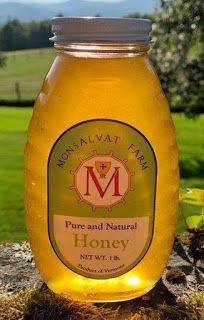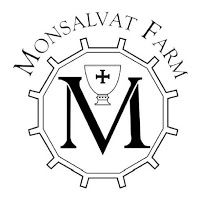The USPTO refused registration of the mark MONSALVAT
FARM (in standard character and design form) for honey,
maple syrup, beeswax, and alpaca hair, because applicant refused to
disclaim the word FARM. Applicant argued that FARM is too ambiguous
to convey any immediate information about an ingredient, quality,
or characteristic of the goods. Furthermore MONSALVAT FARM is
incongruous and unitary, Monsalvat being a fictional magical castle
while "farm" is much more mundane. How do you think this
came out? In re Monsalvat Farm Holdings LLC,
Serial Nos. 88073251, 88073254, 88075987, and 88075991 (May 29,
2020) [not precedential] (Opinion by Judge David K.Heasley).

Examining Attorney Kevin G. Crennan maintained that FARM merely describes the provider of the goods and is therefore merely descriptive of them. He relied on a dictionary definition of "farm," 39 website excerpts showing us of "farm" to describe the same products as those of applicant, and 25 third-party registrations for those products, which registrations include a disclaimer of "farm."
Applicant contended that FARM merely vaguely suggests something about the goods, since FARM is defined as a tract of land devoted to agricultural services and provides no immediate information about the goods. It argued that the third-party websites do not show descriptive use, and that third-partiy disclaimers of "farm" are irrelevant, since each case must be decided on its own merits. In particular, applicant argued that the Board does not know why the word was disclaimed in those cases.
The Board observed that the type of provider of the goods is a feature or characteristic of the goods for purposes of mere descriptiveness. In re E.I. Kane Inc., 221 USPQ 1203 (TTAB 1984), and cases cited therein. "The rule serves the fundamental purposes of descriptiveness refusals: it protects competitors' freedom to describe the type of providers they are." The arguments that "farm" is too vague to be descriptive and that the word must convey an immediate and particular meaning about the goods were rejected in those cases.

The varied third-party uses of "farm" is relevant because they refer to the identified goods as "farm products" or emanating from a farm. The third-party registrations, together with dictionary definitions and third party uses, confirm that FARM is merely descriptive of the goods.
Applicant asserted that MONSALVAT "is popularly known as the fictional magical castle and resting place of the holy grail in Richard Wagner's opera Parsifal." Thus MONSALVAT FARM "[gives] rise to a fanciful and incongruous notion of a lofty and holy site like Monsalvat having some relationship to a humble and utilitarian farm." In applicant's design mark (above), this lofty and holy imagery is reinforced by the inclusion of a depiction of the holy grail as a chalice bearing a Templar's cross. Therefore, applicant argued, because MONSALVAT farm is unitary and incongruous, it need not be disclaimed.
The Examining Attorney and applicant sparred over how many consumers are familiar with the fictional castle in the opera, but in any event, the Board concluded that the marks are not unitary. Consumers will immediately understand FARM as a separate term. In the design marks, the two words are "not so merged together that they cannot be regarded as separate." Nor are they separate on applicant's specimen of use (first above).

Examining Attorney Kevin G. Crennan maintained that FARM merely describes the provider of the goods and is therefore merely descriptive of them. He relied on a dictionary definition of "farm," 39 website excerpts showing us of "farm" to describe the same products as those of applicant, and 25 third-party registrations for those products, which registrations include a disclaimer of "farm."
Applicant contended that FARM merely vaguely suggests something about the goods, since FARM is defined as a tract of land devoted to agricultural services and provides no immediate information about the goods. It argued that the third-party websites do not show descriptive use, and that third-partiy disclaimers of "farm" are irrelevant, since each case must be decided on its own merits. In particular, applicant argued that the Board does not know why the word was disclaimed in those cases.
The Board observed that the type of provider of the goods is a feature or characteristic of the goods for purposes of mere descriptiveness. In re E.I. Kane Inc., 221 USPQ 1203 (TTAB 1984), and cases cited therein. "The rule serves the fundamental purposes of descriptiveness refusals: it protects competitors' freedom to describe the type of providers they are." The arguments that "farm" is too vague to be descriptive and that the word must convey an immediate and particular meaning about the goods were rejected in those cases.

The varied third-party uses of "farm" is relevant because they refer to the identified goods as "farm products" or emanating from a farm. The third-party registrations, together with dictionary definitions and third party uses, confirm that FARM is merely descriptive of the goods.
Applicant asserted that MONSALVAT "is popularly known as the fictional magical castle and resting place of the holy grail in Richard Wagner's opera Parsifal." Thus MONSALVAT FARM "[gives] rise to a fanciful and incongruous notion of a lofty and holy site like Monsalvat having some relationship to a humble and utilitarian farm." In applicant's design mark (above), this lofty and holy imagery is reinforced by the inclusion of a depiction of the holy grail as a chalice bearing a Templar's cross. Therefore, applicant argued, because MONSALVAT farm is unitary and incongruous, it need not be disclaimed.
The Examining Attorney and applicant sparred over how many consumers are familiar with the fictional castle in the opera, but in any event, the Board concluded that the marks are not unitary. Consumers will immediately understand FARM as a separate term. In the design marks, the two words are "not so merged together that they cannot be regarded as separate." Nor are they separate on applicant's specimen of use (first above).
The words in question - MONSALVAT
FARMS - have the same meaning whether considered individually or as
a whole, neither changes the other, nor is the whole any more (or
less) than the sum of its parts. As the Examining Attorney
succinctly puts it "[i]n the end, a farm is a
farm."
And so the Board affirmed the disclaimer requirement.
The content of this article is intended to provide a general guide to the subject matter. Specialist advice should be sought about your specific circumstances.
